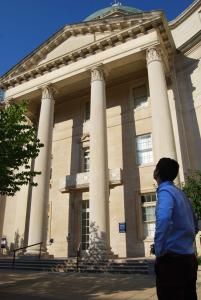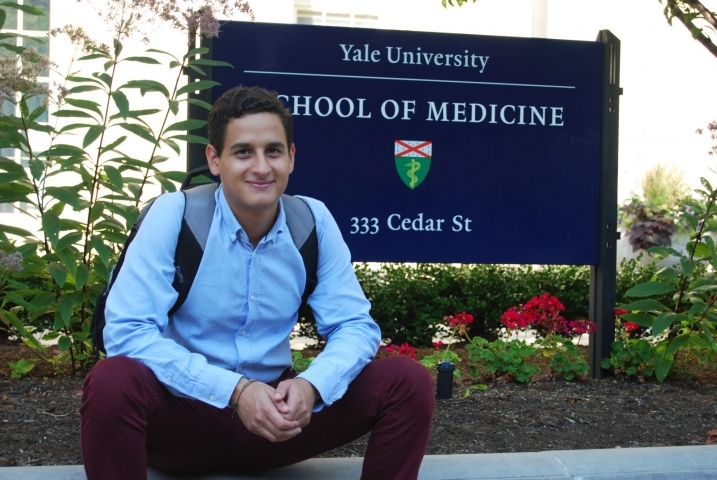GHLI Forum for Change: Navigating the ‘Ecology of Peace’ framework - Colombia
Introduction
Yale Global Health Leadership Institute (GHLI) Forum for Change in Colombia ECD Initiatives Yale Global Health Leadership Institute (GHLI) Forum for Change in Colombia Early Childhood Development (ECD) Initiatives Based on the ongoing work of Angelica Pongutam PhD., M.P.H., Associate Research Scientist in the Yale Child Study Center, with the Fundacion Saldarriaga Concha in Bogota, Colombia, that utilized the Ecology of Peace Framework to mobilize national funding for early childhood, the Fundacion sent intern, Alejandro Diaz Oramas, to Yale in the summer of 2015.
Alejandro describes his eight weeks spent at the Child Study Center and School of Public Health as having been a “great opportunity to take a leap forward to creating a new paradigm for understanding Peace”. In the blog below, he further elaborates in response to Dr. Ponguta’s three questions pertaining to his summer exchange experience in relationship to peace building through early childhood development.
1. What were the goals and main accomplishments of your summer experience, as they relate to enhancing your understanding and practice of peace building through ECD?
Alex: Our Agency heard of the work the Yale Child Study Center was leading in the field of Early Childhood Development (ECD) and peace. We were very interested in this multidisciplinary endeavor because it posited a series of challenging hypotheses that motivated us to think in cutting-edge theoretical and research to ECD. Majored in Government and International Relations, I had always been interested in strategies around peacemaking and peace building in Colombia and around the world. When I found out about the Ecology of Peace (EoP) framework I was amazed by the innovative approach they had on peace and ECD. I thought this internship would be a great opportunity to take a leap forward to creating a new paradigm for understanding peace.
The primary goal of my summer internship at Yale University was to find a way to incorporate the Ecology of Peace framework into the Agency’s core objective of promoting the social inclusion of People with Disabilities, Early Childhood and Older Persons in a peacemaking and peace building perspective. First of all, it was necessary to analyze and deconstruct the framework so as to carefully select the conceptual premises and theoretical foundations that would fit into the Agency’s projects and programs. Given the fact that the framework still finds itself in a nascent stage, we found it interesting to try to actually test the framework and provide empirical evidence that would continue to shape the Ecology of Peace construct.
In order to do that, it was crucial to learn the research methods used in these types of studies. Thanks to the YCSC and the Agency’s sponsorship I had the chance of taking the summer Epidemiology course of the Advanced Professional MPH program of the Yale School of Public Health. The experience of learning new and useful research methods from the Health Sciences was invaluable both from a personal and professional perspective. The course served as a scientific guide throughout the process of analysis of the EoP framework and future project design and specifically, finding ways in which we could measure peace-oriented strategies in ECD projects and programs from an individual, relational, communal and policy perspectives.
2. Why do you think governments should invest in ECD as a pathway to peace building?
 Alex: First of all, I think governments should recognize that Early Childhood constitutes a crucial period in which human capital is formed. Many of the skills and knowledge we are able to store and use daily depends on our development when we were children. ECD marks a period of our lives in which our social, emotional and mental (un)met necessities outline up to an important extent our personal wellbeing and our contribution to society. The peacefulness of our social interactions along our life course is strongly defined during the first years of our lives.
Alex: First of all, I think governments should recognize that Early Childhood constitutes a crucial period in which human capital is formed. Many of the skills and knowledge we are able to store and use daily depends on our development when we were children. ECD marks a period of our lives in which our social, emotional and mental (un)met necessities outline up to an important extent our personal wellbeing and our contribution to society. The peacefulness of our social interactions along our life course is strongly defined during the first years of our lives.
Second of all, governments have to understand that peace is a public good and as such, they should invest in it to provide access anytime, anywhere, no matter the circumstances. An insufficient, incomplete or inadequate development of the Early Childhood not only hinders its access to peace but also represents a loss of welfare of the society it governs. A long lasting peace involves long-run investments. If governments want to end stagnating poverty cycles which are rooted in an unequal access to optimal development at an early stage of life, they have to mobilize resources toward ending this type of structural violence.
This last point should remind us that although governments are not the only responsible for ECD, they have the main responsibility of creating public policies that serve as investment guidelines for other governmental agencies (local and national) and key stakeholders such as Saldarriaga Concha Foundation.
3. How do you see yourself contributing or leading the ECD and peace building agenda in the future?
Alex: This experience has deepened my engagement in peace building initiatives that understand human development as an ongoing dynamic process that starts in prenatal environments henceforth. I see myself researching in the field related to the ecology around peace including ECD, and advocating in political or diplomatic settings the results of evidence-based interventions that set the stage for a more peaceful society.
JOIN THE CONVERSATION
For breaking news and to stay connected, follow us on social media. Sign up to get our E-News delivered straight to your inbox.


